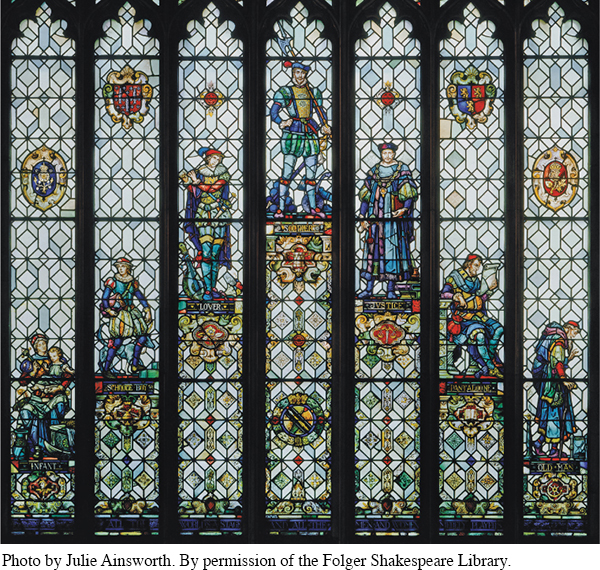5.8
The Seven Ages of Man
William Shakespeare

William Shakespeare (1564–
KEY CONTEXT The excerpt that follows is from the comedy As You Like It (1603), which is about a group of exiled noblemen and women who find love amid mistaken identities in a forest in rural France. The speech below, one of Shakespeare’s most famous, is delivered as a monologue by the often-
159
All the world’s a stage,
And all the men and women merely players.
They have their exits and their entrances,
And one man in his time plays many parts,
5 His acts being seven ages. At first the infant,
Mewling and puking in the nurse’s arms.
Then the whining schoolboy, with his satchel
And shining morning face, creeping like snail
Unwillingly to school. And then the lover,
10 Sighing like furnace, with a woeful ballad
Made to his mistress’ eyebrow. Then a soldier,
Full of strange oaths, and bearded like the pard,1
Jealous in honor, sudden, and quick in quarrel,
Seeking the bubble reputation
15 Even in the cannon’s mouth. And then the justice,
In fair round belly with good capon2 lined,
With eyes severe and beard of formal cut,
Full of wise saws and modern instances;
And so he plays his part. The sixth age shifts
20 Into the lean and slippered pantaloon,3
With spectacles on nose and pouch on side,
His youthful hose, well saved, a world too wide
For his shrunk shank;4 and his big manly voice,
Turning again toward childish treble, pipes
25 And whistles in his sound. Last scene of all,
That ends this strange eventful history,
Is second childishness and mere oblivion,
Sans teeth, sans eyes, sans taste, sans everything.
160
seeing connections
In a reading room at the Folger Shakespeare Library in Washington, D.C., there is a large stained glass by artist Nicola d’Ascenzo that represents each of the seven ages of man.
Examine each section of the stained glass shown here and explain which words or phrases from Jaques’s speech you think likely contributed to d’Ascenzo’s interpretation.

Understanding and Interpreting
Paraphrase the seven ages in seven sentences.
Explain William Shakespeare’s opening metaphor: “All the world’s a stage, / And all the men and women merely players.” How is life like being an actor onstage? What aspects of life are not accounted for in this metaphor?
Clearly these seven ages of man have been selected intentionally to represent a fairly gloomy outlook on life. What ages of man are missing and how would their inclusion change the meaning of the monologue?
161
Analyzing Language, Style, and Structure
After the opening line, Shakespeare writes “the men and women merely players.” What is the effect of the word “merely” in the second line? How would the tone be different if that word was not included?
Shakespeare uses a number of similes to describe the stages men and women go through in life. Paraphrase each of the following similes and explain how each contributes to the overall tone:
“creeping like snail” (l. 8)
“Sighing like furnace” (l. 10)
“bearded like the pard” (l. 12)
In addition to using similes, Shakespeare also uses imagery to describe many of the stages of life. Paraphrase each of the following lines and explain how each contributes to the overall theme:
“Mewling and puking in the nurse’s arms” (l. 6)
“Seeking the bubble reputation / Even in the cannon’s mouth” (ll. 14–
15) “In fair round belly with good capon lined” (l. 16)
“big manly voice, / Turning again toward childish treble, pipes / And whistles in his sound” (ll. 23–
25)
There are a number of places where Shakespeare seems to be mocking the representations of man. Identify one of these lines and explain the specific words that he uses for humor.
What is the effect of the repetition of the word “sans” in the last line?
Each of the stages does not receive the same number of lines: some are longer and some are shorter. Look back through the speech to identify the “ages” with the fewest and most number of lines. What significance can you place on these choices?
What is Shakespeare’s tone toward each of the stages of life? How does this tone change or shift as the speech progresses? Rewrite one or more of the ages with different words that change the tone.
Connecting, Arguing, and Extending
In the opening lines of the speech, Jaques implies that both men and women are included in these ages of “man.” How would his monologue be different if it were specifically about the seven ages of “woman”? Write a line or two that would reflect one or more of these ages.
Jaques, the character from the play who speaks these lines, presents humankind as pretty foolish throughout all seven stages of life. Write a piece in which you argue that Jaques’s representation of our foolishness is either accurate or not. Be sure to use your own experiences and other real-
life events along with lines from the play to support your response. As You Like It was first performed in 1603. Think about how this excerpt from the play would be similar or different if it were written today. Consider differences such as changes in available professions, medical care, life expectancy, technology, transportation, and so on. Then, in poetry or prose, write the “Seven Ages of Twenty-
First- Century Man (or Woman)” to reflect today’s stages of life. Or, using magazine cutouts or your own drawings, construct a contemporary “Seven Ages of Man” collage.